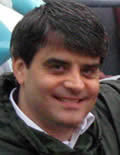
Winning the Tour de France seven times, like hitting 70 home runs, seems almost impossible. Without artificial performance enhancement, a cancer survivor rolling down the Champs Elysees year after triumphant year at an advancing age in a sport known for rampant doping defies not just belief but biology.
To assume that Lance Armstrong achieved all that without the illicit assistance so many of his competitors admit to using elevates him not to the level of inspirational hero but to the status of cartoon superhero. He can’t be real.
Yet he seems to be about the only presumed-innocent athlete left. And he has a case: Armstrong deflects every doping accusation — including the latest that aired last Sunday on 60 Minutes — with references to his clean drug-testing record.
I have no idea what Armstrong did and don’t much care. An admission of doping wouldn’t taint his record in my mind. If he doped, his actions would put him in what appears to be the mainstream of his cycling competition. And if he didn’t, his accomplishments make him such a spectacular freak of nature that he would have no more connection to the average human being than Secretariat.
I’m guessing he’s guilty. In fact, I’d love it if someone of Armstrong’s stature would own up and attempt to start a reasonable conversation about the place of performance-enhancing substances in sports. Common assumptions notwithstanding, University of Wisconsin bioethicist Norman Fost says there is scant evidence to support prohibition among adults.
It’s against the rules, true, but arbitrarily so. Many athletes sleep in hyperbaric chambers, for example, as a “natural” way to increase oxygen-rich blood flow that hastens healing from injuries or recovery from workouts. Fost said on the website Big Think, “Hyperbaric chambers and drugs such as EPO are essentially two means to the same end.”
On HBO’s Real Sports, Fost acknowledged that performance enhancing drugs can cause acne, hair loss and a reduction of good cholesterol. But, he said, no data links them to the life-threatening side effects so widely associated with them. Football and its celebrated collisions show increasing connection to long-term health problems that seem more ominous than anything steroids have been proven to cause.
Since 1992, when NFL behemoth Lyle Alzado died of brain cancer that he blamed on steroids — a connection experts dispute — I can think of only one prominent athlete who has suffered the kind of debilitating disease considered symptomatic of performance-enhancing drug use: Lance Armstrong. Yet after his recovery from testicular cancer that spread to his brain and lungs, his seven Tour victories transcended sports, elevating him to an inspirational level few athletes ever reach. He deserves that status, however he got there, an arduous path by any means, which included a chemotherapy drug that spared his lungs and perhaps his cycling career.
Despite the “fighting” language applied to treatment and recovery, overcoming cancer is not a matter of mere will. Healing requires potent drugs to do what the human body alone cannot. Credit Armstrong for channeling his influence toward funding cancer research, whether he won all those races with or without the kind of artificial help that healed him.
Jason Kelly, a former sports columnist for the South Bend Tribune, is an associate editor of the University of Chicago Magazine. His most recent book is Shelby’s Folly: Jack Dempsey, Doc Kearns, and the Shakedown of a Montana Boomtown. Email him at jasonkelly545@gmail.com.